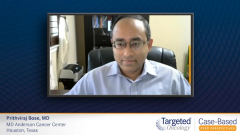
Emergent Data Impacting the Future of Polycythemia Treatment
Dr Bose engages with emergent trial data presented at the American Society of Hematology (ASH) 2022 Annual Meeting.
Episodes in this series

Prithviraj Bose: There was a lot of interesting data reported at this last ASH annual meeting in December 2022 on PV. We've talked about the MAGIC trial, for example, raising some really interesting questions for the field, showing for the first time that Ruxolitinib in a prospective randomized controlled fashion does reduce thrombosis. And that the allele burden reduction with Ruxolitinib is substantial, certainly more than we see in myelofibrosis, which makes sense because PV is a more, an earlier phase disease, so to speak, if you consider the whole spectrum of MPNs and a less genomically complex disease than myelofibrosis. So it's understandable that the allele burden reduction from JAK inhibition would be more in PV than in MF. But as I alluded to earlier, the fact that that allele burden reduction does correlate with improved event-free survival was very interesting to me. And then as I also alluded to earlier ropeginterferon alfa-2b, we now have six years of follow-up from the PROUD and CONTINUATION PV trials. The three-year follow-up was actually published in 2020, but now we are up to six years of follow-up at this last ASH meeting. And ropeg continues to look good, continues to be far superior to best available therapy, which was mostly HU in terms of both hematologic spleen and molecular response, which again is profoundly different between interferon and BAT. And of course, remains to be shown, but suggests that this could lead to disease modification. Along those lines, it has separately been shown by the Cornell group that interferon, not ropeg, but pegylated interferon alfa 2A over years of therapy, you know, improves myelofibrosis-free survival and overall survival. Now, that of course is in their longitudinal experience, not necessarily as part of a randomized control trial, but that's been published. I'll just say a couple of words about rusfertide, this drug, actually, most of the data on this drug, we already heard at prior meetings like ASH 2021 and then ASCO 2022. But this drug has generated a lot of interest and enthusiasm. This is a hepcidin mimetic, as given subcutaneously once a week. And essentially in the phase two study that was known as the revive study, what they did was that they added this drug to patients who may or may not have been on cytoreductive therapy, but were requiring phlebotomies three or more in the preceding six months. And in these patients by 28 weeks, 84% of them were able to eliminate phlebotomy. So the idea being mimetic the action of hepcidin, and therefore you deprive the bone marrow of iron because you're storing all the iron away in the reticular endothelial system. So a very clever mechanism, something very new and novel, but uniquely addressing this one aspect of the disease, which is the hematocrit control and elimination of phlebotomy. So this drug is now in a phase three trial. It's called Verify. It's placebo controlled. Again, it's the similar design. You add placebo to whatever the patient is taking, and they may not be taking cytoreductive therapy also, low risk patients, and see if you're eliminating the phlebotomies, which I suspect will be extremely positive going by the results of the phase two.






































